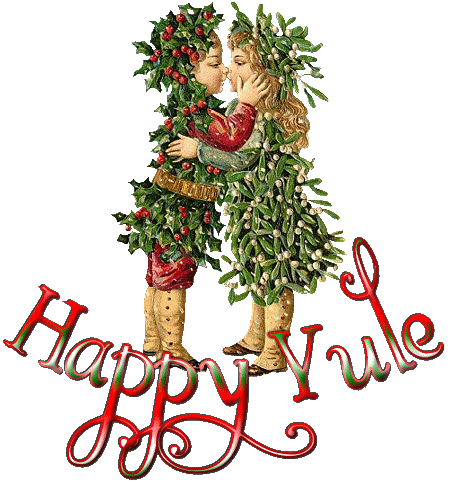While going through old articles I came across
this one from last year that I thought was
worth re-sharing in light of this holiday season.
Today is the shortest day of the year, the Winter Solstice, the beginning of Yule.
Leading up to the Yule and Christmas seasons, I keep coming across articles and poems and lyrics that complain that such and such city/town/school/etc is violating the separation of church and state and forcing religion on some unsuspecting party, or it's Christians complaining that they have lost their winter holiday (or worse, that someone stole Jesus). I recently read an article that consisted of the pasted text of a tacky email poem loosely fashioned after "Night Before Christmas" that bemoaned the use of "Happy Holidays" and other forms of seasonal greetings instead of using "Merry Christmas", and also the perceived encroachment of Chanukkah/Kawanza/Ramadan, and the preemption of America's State religion.
If you ever bother to read the first of the original ten amendments to the U.S. Constitution, known as the Bill of Rights, that was drafted by the so called "christian" founders of the United States, you would know that they expressly forbid the creation of a state religion. At the same time they protected the rights of the country's citizens to observe any faith they choose.
The Jewish holy days of Chanukkah has been expanded and enhanced over the past few decades to accommodate some of the social changes mostly in the U.S. but is slowly spreading. Unlike the christian calendar, the feasts and holiday of the Jewish faith are still celebrated in at least the same seasons as they have been for thousands of years. As I remember from school, Chanukkah celebrates recapturing the temple and finding a smidgen of oil, as the legends tell it, enough oil to light the tabernacle for one day, but that miraculously burned for 8 days.
Kawanza is pretty much a made up from scratch winter holiday, begun in the late 1960's in California, to appeal to some of the "African-American" people. None of my Black friends celebrate Kawanza, about half of them are christian and the other half mostly unaffiliated, though a couple are muslim and a few are pagan.
The Islamic season of prayer and fasting known as Ramadan usually takes place during October and November, rarely crossing over into early December. The mention of Ramadan in some of the prose I have read leading up to the winter holiday season is an overt and out-of-season jab at Islam because of the lingering anti-Islam/Arabism that is rampant in America. Please, not all muslims are terrorists, just as not all christians are saints.
The truth is, that christians don't hold title to winter solstice feasts. The Jews, Hindus, Buddhists, various Eurasian pagan sects, and indigenous peoples of the New World have had feasts and celebrations that centered on the winter solstice. These were feasts to celebrate life and light as the darkest days of the year passed, fertility, and the return of the "sun". During the Roman era these feasts centered on Saturias, the god of light and fire for whom the planet Saturn is named. The Saturian feasts began a few days before the winter soltice and continued for a few days after it. Placing Christmas at the end of the soltice feasts made it more acceptable as did incorporating some of the festivities and icons related to the soltice feasts. Many of the trapping of the now celebrated Christmas season were already in place before the birth of Jesus through the ancient soltice feasts such as evergreen trees, holly, mistletoe, feasting and revelry, and the giving of gifts to friends.
Births were not typically a religious celebration in those days, they were secular celebrations and tended to be reserved for pharaohs, caesars. and other political leaders. Beginning around the second century C.E. the early christians came to add the birth of Jesus to their solstice feasts. Christianity was actually outlawed at the time in the Roman Empire and the christians could more safely celebrate their own religion while others were conducting their winter solstice feasts. In the fifth century the christian calendar was changed to place the date of Jesus' birth to coincide with the winter solstice to aid in converting much of Europe from animistic and pagan religions to instead worship the christian "son".
If one were to study the New Testament they would know from the gospel descriptions that Jesus' birth most likely was in the Spring closer to when christians celebrate Easter or during the summer. That is the time that the shepherds would have been tending their flocks at night. The death of Jesus is correctly depicted in the christian calendar as falling after the Vernal equinox because he and his disciples were congregated in Jerusalem for the Jewish feast of Passover (least you forget that Jesus was not a "christian, he was a Jew, both ethnically and religiously).
 I think that both the knee jerk reactions of the fundamentalist christians and the political correctness of other parts of this society are equally childish and absurd. Religion is a man-made thing, a commodity even; however, Faith is a strong personal and internal belief that should be unshakable by external elements and dogmas.
I think that both the knee jerk reactions of the fundamentalist christians and the political correctness of other parts of this society are equally childish and absurd. Religion is a man-made thing, a commodity even; however, Faith is a strong personal and internal belief that should be unshakable by external elements and dogmas.
Enjoy the season, and the various feasts and celebrations, and quit bickering.
 We're heading into the home stretch with only five more shopping days before it's time to open those gifts under the tree! Are you still a couple gifts shy of being finished with all the shopping? Are you starting to ponder those dark sinister thoughts..."what if I gave that thing-a-gig I got last year to so-and-so?"...they'd never know. Well, you're never going to use it or enjoy it! It's the wrong size, not in your pallet, not your style, not whatever; so, don't berate yourself, give it to someone who will enjoy and appreciate it!
We're heading into the home stretch with only five more shopping days before it's time to open those gifts under the tree! Are you still a couple gifts shy of being finished with all the shopping? Are you starting to ponder those dark sinister thoughts..."what if I gave that thing-a-gig I got last year to so-and-so?"...they'd never know. Well, you're never going to use it or enjoy it! It's the wrong size, not in your pallet, not your style, not whatever; so, don't berate yourself, give it to someone who will enjoy and appreciate it!


